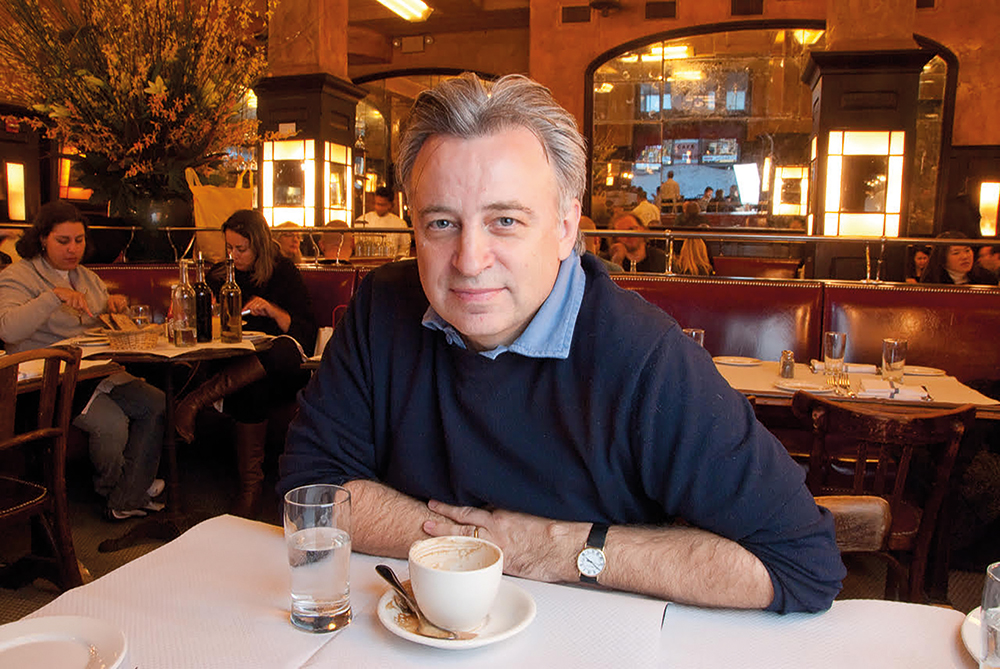
Any of the sizeable audience that the restaurateur Keith McNally – of Balthazar, Minetta Tavern and Pastis fame – has accumulated on Instagram will recognise his appetite for beef. His followers find his attacks on people from James Corden to Michael Palin equally delicious. He tried it with me, too, and launched a series of salvos, despite my admiration of his early game-changing NYC restaurants. Not only was I a corrupt food critic, I was comparable to Boris Johnson and Vladimir Putin. So the idea of reviewing his memoir was clearly tempting – revenge served cold kinda thing. But McNally’s very first sentence outlines his plans to kill himself in the aftermath of a particularly dehumanising stroke. Oh.
This is an odd book – a catalogue of smash-hit restaurants, glamorous elites and what was a supremely successful life until the very real debilitating stroke horror, described in unflinching detail. But McNally appears to have garnered little pleasure in the course of his glittering career, seeming almost embarrassed to be working in the hospitality biz. This, despite a legion of fans, flings with starlets and the attentions of celebrities including Anna Wintour and Madonna.
His regrets are many. They concern his parents; his former bosses; not saying goodbye to friends before they died; losing touch with his children, then co-opting them into his business when they were older; his overblown Marie Antoinette-esque home renovations; his short affairs and long marriages; his pursuit of unattainable women; ‘squandering’ his integrity; and moving to Wigan, aged 22, to atone for ‘the most dissolute month of my life’, spent with bisexual friends in the south of France (details, sadly, not provided).
His dislikes are equally numerous. They include the James Beard Awards (for culinary talent in the US – ‘as repulsive as the Oscars’); ‘self-important food critics’; his brother, on and off; having constantly to open greater restaurants (‘Why must we always resort to hyperbole to retain people’s interest?’); ‘permatanned, coiffured’ Richard Caring of the Ivy (he ‘knew precious little about restaurants but a whole lot about shafting people’); and the unnamed Observer critic: ‘It wasn’t the criticism that bothered me. It was the reviewer’s desperation to be funny.’
And himself. McNally constantly self-lacerates in a way that is presumably supposed to come across as charming but does in fact seem like self-loathing. His stroke was ‘possibly retribution for a life shot through with questionable behaviour’. Even his insults – about the ‘minuscule’ Times food writer Giles Coren – can seem self-referential. He treats his métier with disdain. As he contemplates the mark he might leave on the world, his ‘victory over humanity’ is reduced to ‘lowering the price of Monday’s lunch specials’.
There’s a lot of love from influential friends, including former lover Alan Bennett; yes, that Alan Bennett. And there is love from adult children and wives. But he can’t manage to love himself. Details of wrecked relationships are glossed over. It’s all about Keith, and there is frequent querulousness. When he writes about being driven to suicide (he was found by his younger son, to whom a lifetime of apologies must be owed), it comes across less as ‘farewell cruel world’ and more ‘now they’ll be sorry’.
There are tales of hippy trails and maniacal restaurant renovations. One story sees poor Alan Bennett ferrying vintage mirrors ‘at hearse pace’ to McNally’s first opening – of the still wonderful restaurant Odeon (now owned by his ex-wife, Lynn Wagenknecht). And there’s the odd anecdote that sounds more wish-fulfilment than fact: when the cheapest house wine got mixed up with a $2,000 bottle of Château Mouton Rothschild – the former going to know-nothing bankers, the latter to a young couple. Or the time when the sexy, Saul Bellow-reading night nurse at McLean’s psychiatric facility in Massachussetts, to which McNally was sent post-suicide attempt, gave him his first kiss since the grim incident.
A sizeable chunk of the book is devoted to McNally finding Instagram, which ‘became my voice’ – something he had been missing since his stroke. He grows addicted to the ‘gold coins’ of likes and attention, ramping up his contrariness to troll-like status (he defends Ghislaine Maxwell and Woody Allen). ‘I joined Instagram to piss people off,’ he writes. When he gets Corden in his crosshairs he finally lands the virality he covets. But ‘by writing about something I didn’t have the full facts of, I’d probably stained the career of someone I didn’t know’.
This is not the great literary memoir McNally might like it to be, despite peppering the pages with references to Euripides, Kierkegaard and Jean Renoir. There is humility, too. He’s forever self-deprecating, but since he realises early on in the book the social benefits of fake self-deprecation, it easy to feel as though the reader, too, is being played. Maybe his post-stroke impairment must be taken into account. But then again, given his other regrettable writing projects – ‘woeful’ films and plays – maybe not.
In a characteristic move he has declared on Instagram that his memoir is ‘the worst book ever written’. It’s far from that. It’s a compelling and captivating look into the life of a chippy East End boy made good in the Big Apple with a taste for Manhattan at the height of its glittery allure.
There’s a haunting sense that McNally longs for something impossible – perhaps the seal of approval of the late polymath Jonathan Miller, his longtime friend and quasi-mentor, whom he admired passionately. In McNally’s words: ‘I still crave the success I pretend to despise.’ At the end of the book, he does come to some recognition of his undoubted achievements. And this is an unequivocally great title for a memoir.







Comments